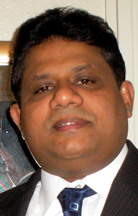|
observer |
|
|
|
|
|
OTHER LINKS |

|

|

|
Dual globalisation - the Sri Lankan contextSunday Observer staffer Afreeha Jawad's interview with Colombo University's Sociologist Dr. Premakumara de Silva gives an insight into types of globalisation and its dynamics in the Sri Lankan socio/economic political scenes not to forget the much missed out wholesomeness in the concept of citizenship.
Certainly its a mistaken notion - I mean to think that globalisation came off only from the west. What's worse is to think that the ongoing western globalisation process was of recent origin. It started during British Colonial times and was very wide ranging - of economics, administration, structure, culture, religion capitalist value system liberalism and was far flung across the African continent, Asia and Latin America. However its grip on Ceylonese society was in 1833 initiating the Colebrooke - Cameron reforms. In fact the year was a launching pad for a modern capitalist society rejecting feudal structures. Modern Man 'came in through radical changes. Under the Dutch and Portuguese this did not happen. Of course we had mercantile trading but with a difference. They continued with the existing socio/economic/cultural structures. The British initiated a total collapse of these structures paralleling the changes emerging in their own countries. Explaining all about their 'modus operandi' Dr. Premakumara said, "Interestingly it was through the local elites they achieved what they wanted. The elitists were given massive land grants who in turn invested in plantations which newly acquired wealth enabled them to enter the political arena. In every sphere of life be they social/political/economic or cultural, the elites were manipulated and globalisation in this way penetrated into Ceylonese Society through the elites." Significantly the landmark year - 1931 saw the entry of universal franchise - a turning point in Sri Lankan politics - a major breakthrough into ultra-nationalism. Explaining all about it Dr. Premakumara said, "The elite that held sway were shaken up because the power of electing their representatives now rested with the people. The elite power was threatened and the best way they thought of overcoming such fear was to play into the sensitivities of the common folk. In order to consolidate their power within the new parliamentary structure, they resorted to ethno-nationalism. Outstanding in this respect was the de-colonisation process, the Sinhala only Bill and not to forget standardisation as well which led to marginalisation of the Tamils. The Sangha, Veda, Guru, Govi, Kamkaru was the class that was addressed. From the sixties to seventies Ceylon relied on support from the socialist block. In fact some Afro/Latin American and Asian countries came under eastern globalisation coming off the communist block that confronted western globalisation. After 1977 the neo-liberal kind of approach by the political elite saw a shift from communist to capitalist globalisation - the failure of the first being its inability into wealth surplus followed by the breakdown of industrial sustenance. However, in the aftermath of 1977 even the existing industries were paralysed as locally manufactured goods failed the fierce competition of imported goods. Significantly Dr. Premakumara observed the operational base of the two systems. "You see pre-independence western capitalism was a joint effort-of external forces joining hands with local elite with decisions coming straight from the British Colonial government. However after 1977 the local elites were the deciding power. Linking the current ethnic friction to globalisation itself Dr. Premakumara said, "Certainly, far greater resources are got through western globalisation and as a result equal resource distribution was not realised which is partly why we see the country in this quagmire." To Sri Lankan ultra nationalist forces Dr. Premakumara made a poignant offering. "Citizenship is a wholesome and all inclusive approach. The absence of the concept of citizenship in a liberal sense has led Sri Lankans develop hegemonic ethno nationalist identities based on ethnicity, language, religion race and so on". Dr. Premakumara hailed the 'Ratavasiya' concept prevalent during the ancient Sinhala Kings time which was equivalent to the all inclusive citizenship concept of today. |
 To think that globalisation is a western delivery is to ignore
globalisation of the kind which the east block had to offer. Global
economies shuttled between these two system based agendas until western
globalisation undermined the other needless to say the dismantling of
the socialist block. The heavily market oriented western globalisation
with its liberal financial policies confronted the eastern globalisation
process not surprising anyway for its rigidity 'closed' and rather not
so lucrative characteristics. Probing into such socio/econ/political
deals and its impact on Sri Lanka recently was Sociologist Colombo
University Dr. Premakumara de Silva.
To think that globalisation is a western delivery is to ignore
globalisation of the kind which the east block had to offer. Global
economies shuttled between these two system based agendas until western
globalisation undermined the other needless to say the dismantling of
the socialist block. The heavily market oriented western globalisation
with its liberal financial policies confronted the eastern globalisation
process not surprising anyway for its rigidity 'closed' and rather not
so lucrative characteristics. Probing into such socio/econ/political
deals and its impact on Sri Lanka recently was Sociologist Colombo
University Dr. Premakumara de Silva. 







